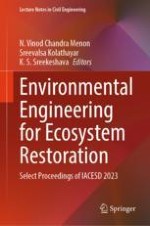2024 | OriginalPaper | Chapter
Quantification of Water Efficiencies in Residential Buildings Through a Case Study
Authors : M. M. Nalina, B. H. Poornima, S. Rashma, R. Deepika, Basavantaraya
Published in: Environmental Engineering for Ecosystem Restoration
Publisher: Springer Nature Singapore
Activate our intelligent search to find suitable subject content or patents.
Select sections of text to find matching patents with Artificial Intelligence. powered by
Select sections of text to find additional relevant content using AI-assisted search. powered by
